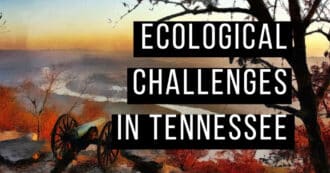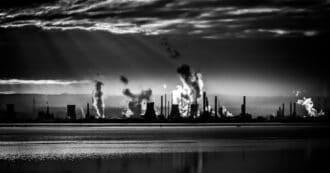By Sydney Cohen – Social ecology is one of the most important fields of study in sociology. It deals with the relationship people have to their social living environment, and how they interact with each other and the environment around them. This includes looking at data like crime rates, poverty levels, education levels, social class, and hierarchy, as well as air quality and pollution levels, and focusing on topics such as population dynamics, resource management, and waste disposal.
The Goal of Social Ecology
It seeks to understand how we are dependent on nature for our existence, but also how humans have negative impacts on it. The goal of social ecology is to create an ecology of freedom that promotes sustainability and balance between humans and nature.
What is Social Ecology?
Social ecology is defined as the study of how human beings interact with and respond to their environment, and how these interactions and relationships influence society as a whole. The field of social ecology examines society holistically, attempting to understand exactly how society’s collective environmental problems stem from social problems, social interaction, and interaction with the environment. Social ecology applies ecological concepts to studying human society, as human beings and non-human beings initially originate similarly.
The Principles of Social Ecology
The core fundamental principles of social ecology are that: 1) ecological issues directly result from social issues, and these environmental problems will only resolve with the amending of social issues, 2) social factors, such as racism, poverty, sexism, and exploitation of developing countries lead to environmental problems.
Social ecology prioritizes the establishment of a more egalitarian society, promoting equality and cooperation with less focus on individual profiting, which frequently results in so many of our world’s social injustices. Social ecology believes that with less inequality in the world, there will be fewer environmental consequences.
Social Ecology Research
Murray Bookchin, born in 1921 in New York, was a leading thinker in the field of social ecology. He wrote extensively about the importance of human relationships to our environment. He developed revolutionary ideas, such as deep ecology and social ecology, that built on the work of European philosophers like Plato and Rousseau. Murray Bookchin was an active socialist who had radical critiques of capitalism. He is best known for his thoughts on environmentalism and the need to create a society that will not harm the environment we live in, a core principle of social ecology. His work has been influential in shaping our understanding of what it means to be human: how we are embedded within nature, and how important it is to protect the Earth from ecological destruction.
The Social Ecological Model
The study of social issues by examining the relationships between all of society’s working parts, that create a whole, brings us into the social-ecological model. The social-ecological model is a social science theory that analyzes the relationships between social factors and environmental factors. It was created by Urie Bronfenbrenner in 1979, who wanted to find a way to look at “the interplay of social institutions with individual development over time. The social-ecological model looks at five levels: microsystem, mesosystem, exosystem, macrosystem, and chronosystem.
The social-ecological model examines the interactions between microsystems (a child’s immediate and physical social environment), mesosystems (systems within the environment), exosystem (broader social, political, and economic conditions), macrosystems (shared beliefs and attitudes of a society). Bronfenbrenner believed that macrosystems influence exosystems, and exosystems directly influence microsystems, all of which affect a child’s development. This social-ecological model acknowledges that everything is connected and can be connected to something else, and to understand societal and environmental problems, one must understand how each system works and affects other systems for society’s function as a whole.
Human Beings, Human Society, Competition, and Social Ecology
Social ecology advocates that the underlying causes of ecological problems directly result from social problems. Capitalism, the majority of the world’s countries’ economic system, calls for competition and individual profit, industrial expansion, and corporate self-interest. Social ecologists have the perspective that the dismissal of ecological problems onto mechanical or technological failure or population growth, ignores economic, political, and social problems, as these are often at the root of accidents, such as oil spills or pollutants in the water, that harm our environment.
A social-ecological perspective is particularly applicable and usable by social workers to help their clients. So frequently, those needing help from social workers are at the bottom of society’s class hierarchy – impoverished families of color. “A holistic approach to finding out how a person or group of people landed in the position they’re in will help a social worker by giving them a look into some of society’s problems and what demographics they affect most.”
Example of the Intersection between Environmental and Social Issues
An example of environmental problems stemming from hierarchical social issues, the crux of what is studied in the field of social ecology, is the deforestation of rainforests. Many communities rely on the natural resources in their nearby rainforests. However, competitive demand for palm oil results in social conflict, land grabs, and loss of livelihood.
When large corporations buy up land to take advantage of the high demand and competition for natural resources, many conflicts occur. The first social conflict from this problem is between communities and the corporations that buy their land. The corporations are essentially stealing the natural resources from the communities that rely on them.
The next social conflict that occurs is between communities and non-native workers. Workers that are moved to work in these rainforests result in fewer jobs for the people who live there. Another social conflict that occurs is within these local communities, as often an income gap is created by those who are able to get jobs working for these large corporations, and those who do not.
Over 50 million Indonesians rely on their forests for their livelihoods. Capitalism not only depletes these natural resources when companies buy and exploit the land but also causes many social and cultural issues among the native groups and communities.
The Social Ecological Impacts of The Destruction of Rainforests.
From a social ecology perspective, one would examine the environmental impacts of deforestation and exploitation of natural resources, such as water pollution, air pollution levels, soil erosion, and flooding, in relationship to capitalism, competition, technological advancement, and profit. There are varying levels of social issues involved in deforestation, named above, and social ecology provides a framework to examine how our relationship to the environment, and our current environmental issues, results from the different facets of social issues.
Social Ecology from Biblical Sources
The relationship between human communities and the environment is described in greater detail in Eco Bible: Volume One: An Ecological Commentary on Genesis and Exodus: Exodus 9:29 – “Moses said to him, ‘As I go out of the city, I shall spread out my hands to the Lord; the thunder will cease and the hail will fall no more, so that you may know that the earth is the Lord’s.'”
In his story “The Master of Prayer,” Rebbe Nachman of Breslov comments that prayer flows best in nature, rather than in a city. He suggests that civilizations are actually more devoid of prayer and God, and how, despite popular opinion, nature actually provides more stability and feeling of civilization than a city.
This draws a similar comparison to social ecology. It emphasizes how our society, which we as human beings have created, has resulted in class hierarchies and an incredibly competitive and unequal economic system. As Rebbe Nachman suggests, perhaps our civilization is uncivilized.
We have a plethora of social issues and inequalities that not only affect human communities but the environment as well. Is it possible that nature, void of civilization and human touch, is a place where one can pray and find God, and where prayer flows best? Social ecology captures the interconnectedness of social and environmental problems so that ideally, the environment and human beings can coexist without inequalities.
The Interconnectedness of All
Ultimately, social ecology is about the process of working toward creating healthy and functioning environments in which people can thrive. It’s a complex system that begins with understanding the interconnectedness of all aspects of society and their impact on ecological problems. That means we must first address our world’s social problems to create sustainable living conditions for everyone – including ourselves.
* Featured image source







